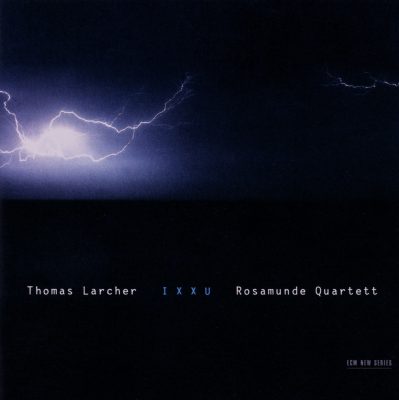Thomas Larcher: IXXU
Thomas Larcher: IXXU, My Illness Is The Medicine I Need, Mumien, Cold Farmer
Rosamunde Quartett, Andrea Lauren Brown (soprano), Christoph Poppen (violin), Thomas Demenga (cello), Thomas Larcher (piano)
© ECM 2006
Awards
German Record Critics Award, Quarterly Critics’ Choice 4/2006
Recommended by the Neue Zeitschrift für Musik
Works
IXXU for string quartet (1998–2004)
flüchtig, nervös
sehr schnell, präzise
ruhig
My Illness Is the Medicine I Need for soprano, violin, cello and piano (2002)
My illness is the medicine I need.
I think I’ll stay here until I die, I’m tired of life. I don’t like freedom. The world frightens me.
Eat and sleep. Eat and slep. The monotony here kills you.
I like it when people ask me the time. It’s almost a conversation.
I don’t know why I’m here. I’ve no idea. I think people are brought here to be killed. I’m scared to death. Death will come to me covering all my body. And I will be silent forever.
Once they give you an injection you instantly stop hearing voices.
Mumien for cello and piano (2001)
tempo giusto
schneller
langsam
Cold Farmer for string quartet (1990)
mit Groove
ruhige Halbe
sehr schnell
ganz langsam
Illness is many things. Indisposition, an amalgamation of cause and symptom, a clinical mystery and emotional nightmare. Thomas Larcher seems less interested in these polarities, however, and more in the sinews that connect them. For him, the notion of illness lives by a fragmented language. Ixxu, ECM’s second disc dedicated to the work of the Austrian composer, is thus a force to be reckoned with. It’s not that each of these world premiere recordings is particularly weighty, but more so that the sheer difficulty of their interpretation and execution is palpable. This is not for mere effect, but rather done in the interest of expanding musical languages to the point of distention. In the composer’s words: “I’m not interested in using shock techniques to flaunt the novelty of my architecture. I want to arrange and enhance the elements so as to produce new expressive values.”
The title string quartet (1998-2004), for one, proves that Larcher’s is a unique compositional voice when such distinction is sometimes hard to come by. He is rhythmically astute, melodically complex, and simply tantalizing to listen to. High-pitched whispers make for organic contrast to the music’s underbelly, culminating in the final movement with haunting charm. Another string quartet, Cold Farmer (1990), ends the album in Hartke territory, with just a touch of Schnittke and Riley to be found in due measure. Its equal dose of whimsy and magical realism make for a composition that would easily fit into the Kronos Quartet’s repertoire, and which completes the frame around the album’s masterful center. In the hands of the ever-capable Rosamunde Quartett, these pieces glitter.
My illness is the medicine I need (2002) for soprano, violin, violoncello and piano is indeed a most competent stroke in the realm of textual settings—these, medical patient statements found, of all places, in a Benetton Colors magazine. Soprano Andrea Lauren Brown embodies in its deft unraveling the very reenactment of a quantifiable cause, so that one’s illness indeed does becomes the only source for its cure. This is symptomatic music par excellence, and pairs well with Mumien (2001/02) for violoncello and piano. What begins as a staccato agitation ends up a handful of threads drawn into a single focused line. The rhythmic integrity of Larcher’s piano is a constant presence, while Thomas Demenga’s cello is the empathic observer, clarifying intentions with every turn of phrase.
The music of Ixxu has the quality of certain nursery rhymes: on the surface playful, perhaps full of holes, yet betraying an amazing wealth of morbid fascination just beneath the surface. Make these your bedtime stories, and you won’t be disappointed.
